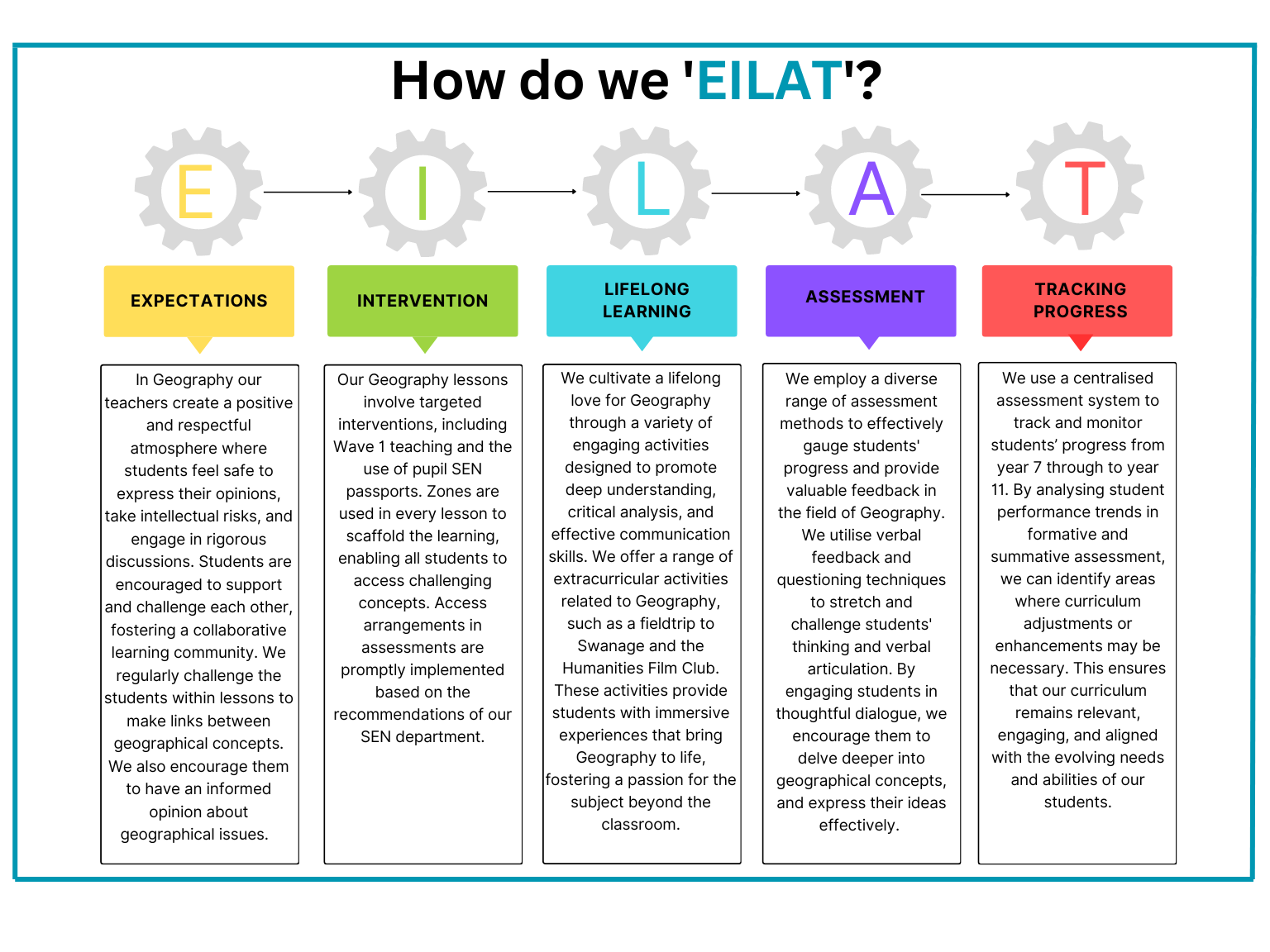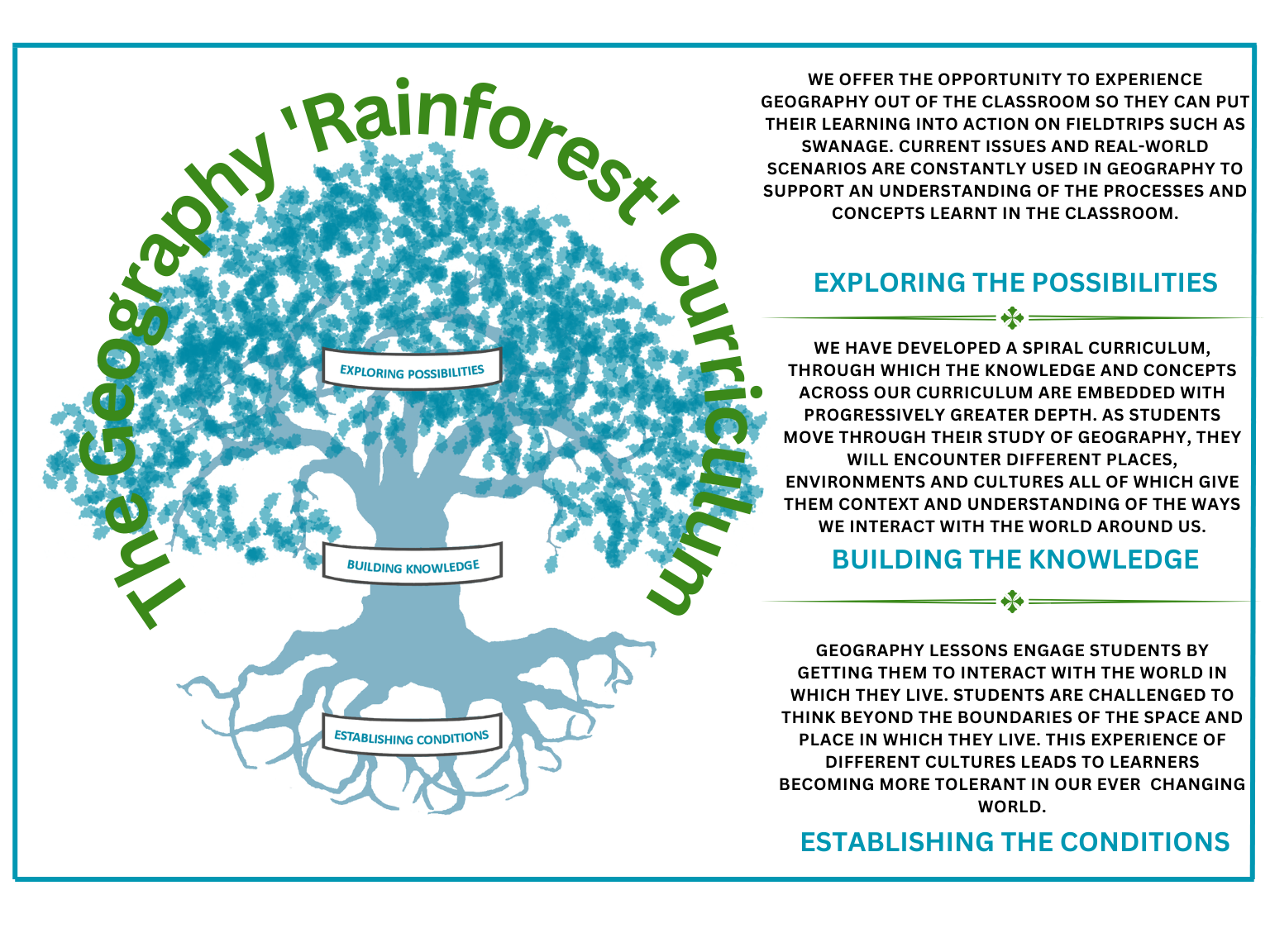Geography
‘Geography is the study of the earth as a home to humankind’ (Johnson, 1985)
Intent
We take great inspiration from the Geographical Association and their Manifesto for Geography (‘A Different View’) believing that there are few things more fundamental than learning about ‘the earth as our home’.
Through their study of geography, we aim to:
- Provide students with the means to think about the world in new ways-’thinking like a geographer’.
- Provide students with the geographical knowledge they need to understand contemporary challenges facing our planet and to live their lives as knowledgeable citizens- aware of their own local communities in a global setting.
- Provide students with the means to (and necessary knowledge to) question, debate and evaluate the knowledge; such that they have the skills to be active participants and investigators- rather than passive recipients of knowledge.
- Expose students to geographical enquiry- allowing them to deepen their conceptual understanding through reasoning, interpreting data, arguing their point and undertaking fieldwork.
- Equip students with the skills they will need to continue to develop their geographical understanding beyond the classroom.
Meta-concepts
The following meta-concepts underpin our curriculum:
- Resilience- Students develop a knowledge of how the physical environment can pose a problem to everyday life and it is important that they understand how we can develop mitigation and adaptation strategies to better cope with this.
- Interdependence- It is important that students understand that physical and human geography does not stand in isolation and that the two regularly interact in the environment in which they live.
- Development- A concept which unpins each unit studied. Students develop an appreciation for the differences within our world and how some countries often struggle to develop at the same rate with others.
- Sustainability- Knowing how to meet the needs of the present without compromising the ability for future generations to meet their own needs is of vital importance to understand in our ever-changing world.
- Mitigation and adaptation- Geographers must know how to adapt and prevent damage to our environment.
- Systems- To understand how human and physical geography interacts students must develop and appreciation for how processes connect with each other.
Implementation
Our Geography curriculum is designed to cultivate a deep understanding of the world's physical and human geography, fostering critical thinking, environmental consciousness, and global citizenship amongst our students. Through the implementation of a spiral curriculum, we introduce students to the fundamental concepts and skills of Geography in KS3 and these are then revisited in KS4 with increasing depth and complexity. This approach allows students to build upon their existing knowledge and skills while deepening their understanding of the subject matter. This results in confident learners who are well equipped to contribute to the world around them.
Key Stage 3
In Key Stage 3 (years 7 to 9), students have four Geography lessons per fortnight.
Year 7 – In year 7, we prioritise teaching the concept of development to foster an understanding of global disparities and wealth distribution. This foundational knowledge prepares students for in-depth country studies beyond year 7, enabling them to comprehend the impact of development on various nations.
Our curriculum also includes units on rivers, flooding, and weather, which offer students a fundamental understanding of physical geography. These topics establish clear connections to the geography of the United Kingdom, which students learn at the beginning of year 7, as well as the development unit. By exploring the interaction between physical and human aspects within geography, students gain firsthand experience of how these factors shape our world. Through this approach, we strive to provide a holistic and interconnected educational experience, empowering students to appreciate their place in the world and develop a comprehensive understanding of geography.
Year 8 – The Almighty Dollar encourages students to apply their developmental knowledge within a context so that they have the foundations of geographical economics which can then be applied beyond year 8. Settlement is taught to examine local scales of development in different countries for students to build an appreciation of how the place they live compares to towns and cities globally. In the latter part of Year 8, our curriculum delves into population and migration. This unit allows students to explore how settlements can undergo transformations as a result of human movement. By providing an unbiased perspective, we equip students with the tools to challenge any preconceived notions or misconceptions they may have had. The study of coasts offers students the opportunity to deepen their knowledge of the processes they previously learnt in the rivers and flooding unit. By applying these concepts to a different physical context, students develop a comprehensive understanding of how physical geography can impact people's lives. Furthermore, this unit encourages them to grapple with the complex decisions that must be made in response to these challenges. Resources and climate change enables students to enhance their understanding of the origins of essential resources such as food, water, and energy. By engaging with this topic, students can make informed judgements on the significance of these resources for their future. This empowers them to make responsible decisions that resonate with their day-to-day lives.
Year 9 – Students begin year 9 by applying their knowledge of development to global tourism. Here they are given the opportunity to use their understanding of physical and human geography and examine the close interaction between them. This unit is followed by the economics of the living world which give students the opportunity to appreciate how some countries do not have the luxury of being able to protect their fragile physical environment. This is followed by a decision-making exercise where students are challenged to utilise information given on a scenario which uses knowledge gained since they started in Year 7 and encourages them to debate topical issues. Finally, students look at the range of natural hazards that can impact our world. They focus on the implications these have for countries and learn to evaluate the ways in which these can be managed.
Key Stage 4
In Key Stage 4 (years 10 and 11), students have six lessons per fortnight. We offer further personalised intervention for our KS4 students which focuses on embedding exam skills and gives them an opportunity to revisit some content knowledge.
Year 10 – In year 10, students deepen their understanding and knowledge of the economic world by studying two contrasting countries: Nigeria and the UK. They then discover at greater depth the physical processes of rivers and coasts and the impact these have on the human environment in preparation for going on their fieldwork to Swanage.
Year 11 - In their final GCSE year students are given the opportunity to study urban areas at greater depth by comparing the city of Rio with London giving them a greater appreciation for the challenges faced in not only LICs but also HICs. Finally, students study resource management with a focus on food as a resource. This unit gives student an appreciation for the challenges the UK faces with resources currently and into the future, as well as allowing students to understand how important food is as a resource globally.
Ultimately, our Geography curriculum develops students' skills and knowledge, exposing them to a range of geographical case studies and meta-concepts, while fostering their geographical literacy and numeracy skills and analytical abilities. This ultimately prepares them to become consciences citizens who can make informed decisions about the world around them.

Impact
At Jubilee High School, the Geography curriculum has been designed to have a profound and lasting impact on our students' education and personal development. We aim to empower our students to become knowledgeable, compassionate, and engaged global citizens who can contribute positively to society and make informed decisions that shape a sustainable and inclusive future for all.




